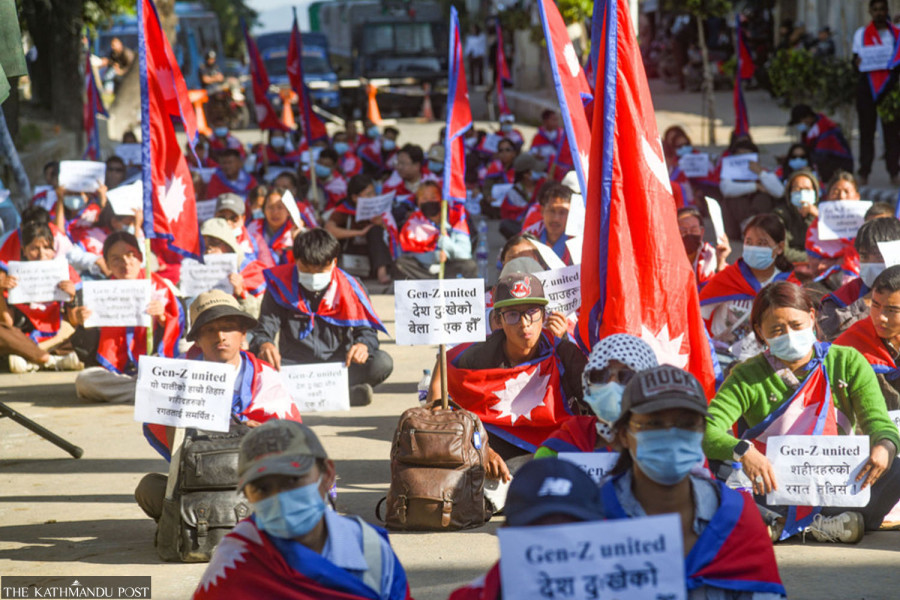Politics
Gen Z seeks accord for ‘legitimacy’ of September uprising
Youth leaders share text of agreement with government and also plan to inform the political parties about it.
Anil Giri
In order to give legitimacy to the September Gen Z uprising, various Gen Z groups have taken initiatives to sign an accord with the state.
If things go as planned, the draft will be ready for signing within a week, various Gen Z leaders have said.
At least seven to eight Gen Z groups are negotiating in a bid to reach an understanding soon, said Ajaya Bhadra Khanal, chief adviser to Prime Minister Sushila Karki.
From the government’s side, Khanal is coordinating with different Gen Z groups in order to streamline the document that institutionalises their demands, so as to give recognition to the Gen Z movement and also develop the document as a political blueprint which will help clarify Gen Z’s thinking about the country’s political future.
Two Gen Z leaders told the Post that they have prepared a consolidated and common document which reflects the achievements of the Gen Z movement. It also outlines ways to address the dreams of those who died or got injured during the movement and what Gen Z really want.
They want to sign the accord with President Ramchandra Paudel. During a recent meeting between the President, prime minister and Gen Z leaders, the youths also raised the issue of signing a tripartite agreement between the head of state, the prime minister and Gen Z leaders.
But President Paudel had indirectly hinted that he supports the achievements of the Gen Z movement and it has already gotten legitimacy from the people. An aide to President Paudel told the Post that it is not a job of the head of state to sign an accord.
It is the job of the government to sign the deal, the aide said. “The President does not hold any executive role with which to meet the demands of Gen Z. Such an accord can instead be signed between the government and the Gen Z leaders,” he said.
Otherwise, a middle path is being sought: to sign an accord between the government and Gen Z representatives in the presence of the President.
“We have shared our initial draft with the government side and will soon sit with the prime minister to give it a final touch,” Ojaswi Thapa, a Gen Z leader who is also involved in preparing the draft, told the Post. “We have been searching for a common ground and understanding so that all voices are heard.”
Both the government and the Gen Z side give the example of the Comprehensive Peace Accord (CPA) signed in 2006 between the erstwhile government and then CPN (Maoist) to end the decade-long insurgency.
The accord paved the way for the peace process, elections to the Constituent Assembly, integration of a section of Maoist combatants into the Nepali Army, laying down of the arms, and formation of the two commissions related to the truth and reconciliation and disappearance.
“We have finalised nearly 70 percent of the draft, and hope to complete it by next week. The proposed version will be amended after consultations with the government,” said Thapa. “The text of the agreement will be endorsed by the Cabinet, thus creating an environment for the President to sign the accord.”
The Gen Z have put forth demands such as corruption control, addressing the grievances of the families of those killed in the September 8-9 protests, and changes in the political system, among others.
The Gen Z also want endorsement of a new act to govern the Commission for the Investigation for Abuse of Authority (CIAA), and formation of a commission to address the demands of the bereaved families and the injured people. A bill on corruption control has been tabled at the Parliament Secretariat.
On the political side, the Gen Z leaders said that they do not want to replace the republican set-up but people want some kind of change. Therefore, they are putting pressure on the government to hold a referendum on the political system.
“Our demands are related to Nepali citizens, not only Gen Z. This documentation is for the Nepali people. It gives legitimacy to our movement,” said Thapa. “We will also call for an investigation into the incidents of September 8, and what operational mistakes were made that day. The criminal activities should be investigated.”
Another Gen Z leader, Rijan Rana, said a draft prepared by the Gen Z groups has been forwarded to the government side for consideration.
“The text will be jointly signed between us, the President and the prime minister. The President was positive about signing such an accord while we met him at his office,” said Rana.
According to Rana, leaders from various political parties are engaged on an individual basis but structured talks are yet to start.
Political parties will not be part of the agreement. The government is soon planning to hold a meeting with the political parties and Gen Z, where youth leaders will explain the accord’s text to the political leaders.
Rana further said that fundamental features of the constitution such as proportional representation, multi-party democracy, republican system, federalism and secularism are non-negotiationable.
“We are in favour of institutionalising the changes of all past movements and revolutions,” Rana added.




 10.12°C Kathmandu
10.12°C Kathmandu















